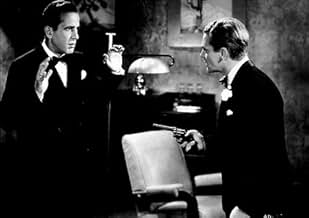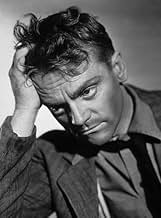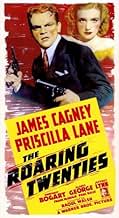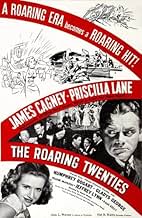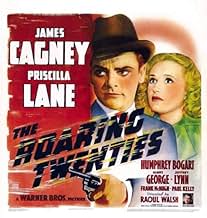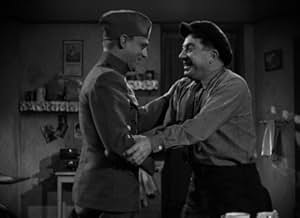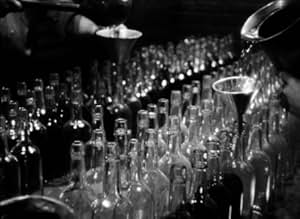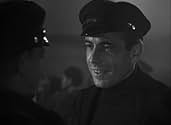Three men attempt to make a living in Prohibitionist America after returning home from fighting together in World War I.Three men attempt to make a living in Prohibitionist America after returning home from fighting together in World War I.Three men attempt to make a living in Prohibitionist America after returning home from fighting together in World War I.
- Awards
- 2 wins
Elisabeth Risdon
- Mrs. Sherman
- (as Elizabeth Risdon)
Edward Keane
- Henderson
- (as Ed Keane)
Eddy Chandler
- Second Detective
- (as Eddie Chandler)
John Deering
- Narrator
- (voice)
Storyline
Did you know
- TriviaThis marked the end of James Cagney's cycle of gangster films for Warner Bros. Cagney wanted to diversify his roles: he would not play a gangster again until White Heat (1949), ten years later.
- GoofsWhen Eddie and his men impersonate the Coast Guard, there's a miniature shot of the two boats pulling alongside each other. Nick's rum runner boat that George captains is a much taller boat and its deck is higher above the water than the smaller vessel. Yet when the shot changes to live action and Eddie's crew is throwing mooring lines across to the bigger boat, the decks are now the same height; furthermore, when the men cross from one boat to the other, they merely step over the rail instead of needing to climb up to the taller boat's deck.
- Quotes
[last lines]
Panama Smith: He's dead.
Cop: Well, who is this guy?
Panama Smith: This is Eddie Bartlett.
Cop: Well, how're you hooked up with him?
Panama Smith: I could never figure it out.
Cop: What was his business?
Panama Smith: He used to be a big shot.
- ConnectionsEdited from The Public Enemy (1931)
- SoundtracksI'm Just Wild About Harry
(1921) (uncredited)
Music by Eubie Blake
Lyrics by Noble Sissle
Played during the opening and closing credits
Also played during the 1922 montage
Sung by Priscilla Lane at the club
Featured review
... before Bogart's star really begins to rise in the 1940's though not at Cagney's expense, but instead at George Raft's. But I digress.
The Roaring Twenties traces about 20 years of American history, from 1917 to the mid 1930s, starting with three men in a fox hole in France in WWI - Eddie Bartlett (James Cagney), George Hally (Humphrey Bogart), and Lloyd Hart (Jeffrey Lynn). You get to know their basic character here. Lloyd doesn't want to shoot a German soldier because he's just a kid of about 15. George shoots him instead and seems to enjoy it. Immediately afterwards the war ends. No thought or mention of the 15 year old who just bought it seconds before the war ended. As for Eddie - He is pragmatic. He doesn't enjoy violence but realizes it is sometimes necessary.
Back in America, Eddie can't catch a break and find a job. His old job was given to somebody else, so he drives his friend's (Frank McHugh as Danny) cab when Danny is off duty in order to make ends meet. One day, after Prohibition begins, Eddie delivers a package for a fare and ends up getting caught for violating the Volstead act - the package has liquor in it. The woman who would have gone to jail, saloon keeper Panama (Gladys George) pays Eddie's fine and brings him into the liquor business with her. Eddie can be tough, but he hasn't had to use gunplay until he decides to expand and bring his old war buddy George into the business. George, the guy who enjoys killing, gets Eddie in deeper as far as the violence goes, and George's slimy little weasel ways are Eddie's ultimate undoing.
So Cagney's character is the tough guy with which you can sympathize - he didn't start out a criminal but was rejected by the country he served and the woman he loved, Bogart is the evil guy who is at least smart enough to not play the stock market in 1929, and Gladys George is the tough "broad" who loves Cagney's Eddie but realizes it will never be mutual. Surrounding all of this is a great score with that brassy Warner Brothers orchestra front and center.
This is not the best of the 1930s gangster films - Those were made in the precode era when they could be more realistic. But this one has WB's best contract players and stars of the era and is a fun ride with a minimum of moralizing considering this is a production code era film.
The Roaring Twenties traces about 20 years of American history, from 1917 to the mid 1930s, starting with three men in a fox hole in France in WWI - Eddie Bartlett (James Cagney), George Hally (Humphrey Bogart), and Lloyd Hart (Jeffrey Lynn). You get to know their basic character here. Lloyd doesn't want to shoot a German soldier because he's just a kid of about 15. George shoots him instead and seems to enjoy it. Immediately afterwards the war ends. No thought or mention of the 15 year old who just bought it seconds before the war ended. As for Eddie - He is pragmatic. He doesn't enjoy violence but realizes it is sometimes necessary.
Back in America, Eddie can't catch a break and find a job. His old job was given to somebody else, so he drives his friend's (Frank McHugh as Danny) cab when Danny is off duty in order to make ends meet. One day, after Prohibition begins, Eddie delivers a package for a fare and ends up getting caught for violating the Volstead act - the package has liquor in it. The woman who would have gone to jail, saloon keeper Panama (Gladys George) pays Eddie's fine and brings him into the liquor business with her. Eddie can be tough, but he hasn't had to use gunplay until he decides to expand and bring his old war buddy George into the business. George, the guy who enjoys killing, gets Eddie in deeper as far as the violence goes, and George's slimy little weasel ways are Eddie's ultimate undoing.
So Cagney's character is the tough guy with which you can sympathize - he didn't start out a criminal but was rejected by the country he served and the woman he loved, Bogart is the evil guy who is at least smart enough to not play the stock market in 1929, and Gladys George is the tough "broad" who loves Cagney's Eddie but realizes it will never be mutual. Surrounding all of this is a great score with that brassy Warner Brothers orchestra front and center.
This is not the best of the 1930s gangster films - Those were made in the precode era when they could be more realistic. But this one has WB's best contract players and stars of the era and is a fun ride with a minimum of moralizing considering this is a production code era film.
Everything New on Max in December
Everything New on Max in December
Looking for something different to add to your Watchlist? Take a peek at what movies and TV shows are coming to streaming this month.
- How long is The Roaring Twenties?Powered by Alexa
Details
- Runtime1 hour 46 minutes
- Color
- Sound mix
- Aspect ratio
- 1.37 : 1
Contribute to this page
Suggest an edit or add missing content

Top Gap
What is the Brazilian Portuguese language plot outline for The Roaring Twenties (1939)?
Answer

